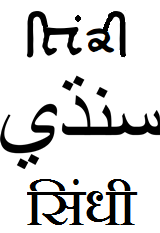Language/Sindhi/Grammar/Reported-Speech
Introduction
In this lesson, we will learn how to use reported speech in Sindhi. Reported speech is used when we want to talk about what someone else said. We will learn about changing direct speech to indirect speech and using reporting verbs.
Reported speech is an advanced grammar concept, so it is important to have a good understanding of basic grammar concepts before attempting to learn this topic.
Direct and Indirect Speech
Direct speech is when we report someone's words exactly as they said them, using quotation marks. For example, if someone says, "I am going to the store," we would write:
"من دکان جائيندو آهيان."
Indirect speech is when we report what someone said without using their exact words. We must change the tense and pronouns to match the new context. For example, if we want to report the above statement in indirect speech, we would write:
"او ڀت ڪري آهندي کہ انهون جي ڪرڻ هي دکان جاندي آهن."
Notice that the verb "going" was changed to "had gone" and "I" was changed to "he/she."
Changing Direct Speech to Indirect Speech
When changing direct speech to indirect speech, we need to follow certain rules.
Rule 1: Tense Change
When changing direct speech to indirect speech, we need to change the tense of the verb. The tense changes as follows:
| Direct Speech || Indirect Speech | | present simple || past simple | | present continuous || past continuous | | present perfect || past perfect | | past simple || past perfect | | past continuous || past perfect continuous | | past perfect || past perfect |
For example: Direct speech: "I am watching TV." Indirect speech: "او ڀت ڪري آهندي کہ من ٽيليويزن وڌندي آهن."
Notice in the indirect speech, we have changed "am watching" to "was watching."
Rule 2: Pronoun Change
When changing direct speech to indirect speech, we also need to change the pronouns. The pronoun changes as follows:
| Direct Speech || Indirect Speech | | I || he/she | | we || they | | you || you | | he/she/it || they | | they || they |
For example: Direct speech: "I like ice cream." Indirect speech: "او ڀت ڪري آهندي کہ انهون کي آئس ڪريم پسند آهي."
Notice in the indirect speech, we have changed "I" to "he/she" and "like" to "liked."
Rule 3: Reporting Verb
When changing direct speech to indirect speech, we also need to use a reporting verb to indicate that we are reporting what someone else said. Some common reporting verbs used in Sindhi include:
| Reporting Verb || Example | | جيڪڏهن || او ڀت هڪ جملن ٽيکيدو۔ جيڪڏهن، من مڌگهاري سان ٽيفاني جتني ڦتيو۔ | | کنهنجو || او ڀت هڪ جملن ٽيکيدو۔ کنهنجو، پاڪستان پلها۔ | | وڏو || او ڀت هڪ جملن ٽيکيدو۔ وڏو، انهون کي ھڪ ٽيم حڪم ديسو۔ |
For example: Direct speech: "I am tired." Indirect speech: "جيڪڏهن من اوڀت ٿيا سان تهنجي نڪل تڪ آڻيو ٿا."
Notice in the indirect speech, we have used the reporting verb "جيڪڏهن."
Using Reported Speech
Now that we know how to change direct speech to indirect speech, let's look at how to use reported speech in sentences.
Example 1
Direct speech: "I will come tomorrow." Indirect speech: "او ڀت ڪري آهندي کہ ٻلها پئوندو آهندي."
In the above example, we have used indirect speech to report what someone said. We used the past tense "will come" to create indirect speech, and the pronoun "I" was changed to "he/she."
Example 2
Direct speech: "She said to me, 'I am hungry.'" Indirect speech: "جيڪڏهن اُنهن جو ڪها ته مڙههن ۾ آهيا، 'من جيجانداس سان بہوڪي ويوڻ.' ڪنهنجو چاهوندو که، ڀت تهن ڦيا."
In the above example, we are reporting what someone else said to us. We used the reporting verb "جيڪڏهن" to indicate that we are reporting what someone else said. We also changed "I" to "he/she" and "am hungry" to "was hungry."
Example 3
Direct speech: "They are playing basketball." Indirect speech: "کنهنجو، اڳ فاصلون جو کهڙي ڪري رهندي آهندي."
In the above example, we are reporting what someone else is doing. We used the present continuous tense "are playing" to create indirect speech, and the pronoun "they" was not changed.
Conclusion
Reported speech is an important grammar concept in Sindhi. In this lesson, we learned how to change direct speech to indirect speech, use reporting verbs, and form reported speech sentences. By mastering this concept, you will be able to communicate more effectively in Sindhi.
Other Lessons
- Pronouns
- Questions
- Verbs and Tenses
- Future Tense
- 0 to A1 Course
- Question Formation
- Negation
- How to Use Be
- Plurals
- How to Use Have
Sources

